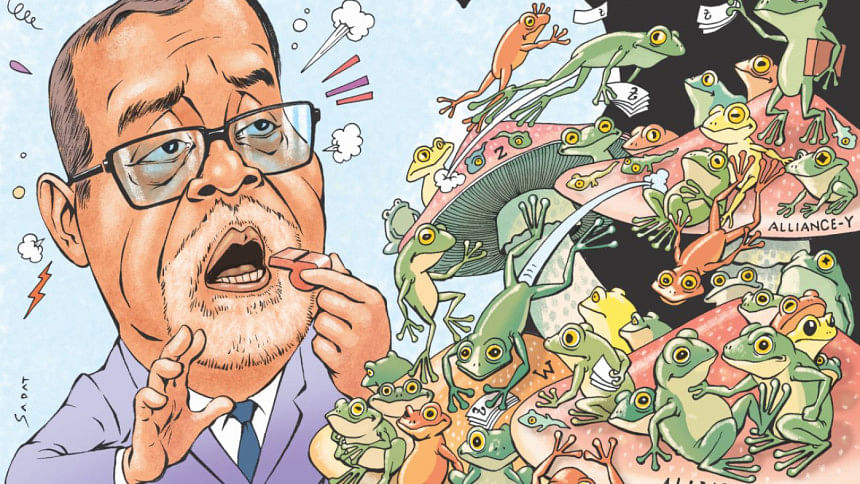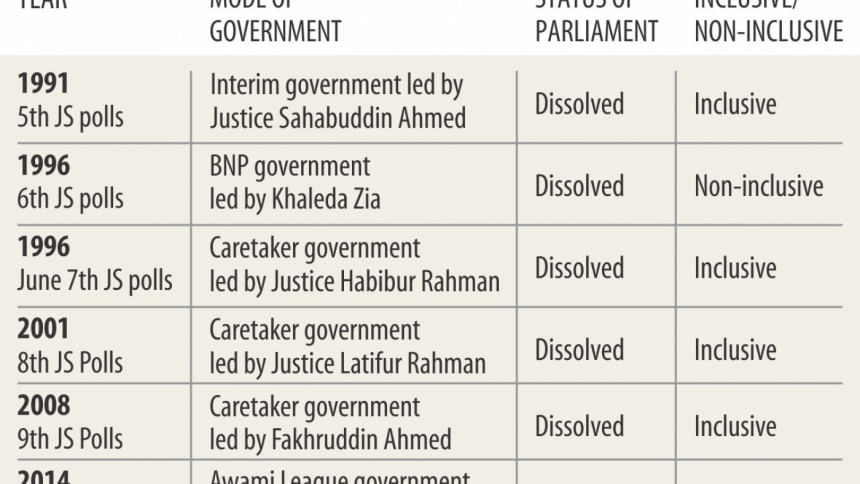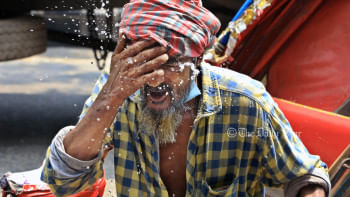Thorny issues remain thorny

Less than two weeks before the 90-day countdown for holding the general election begins, a number of contentious political issues remain unresolved.
The issues include the nature of the polls-time government and dissolution of parliament before announcement of the election schedule -- two key demands of the BNP and some other opposition parties.
Under the constitutional provision introduced in 2011, the next national election must be held within 90 days before the five-year term of the current parliament expires on January 28. And the Election Commission has said it would announce the schedule any day after the countdown begins on October 31.

The government and the ruling Awami League have already rejected the opposition demand for a nonpartisan administration and dissolution of parliament, saying the election will be held in line with the constitutional provisions -- that is under the current government.
However, the size of the government during the election remains unclear.
The prime minister and some of her cabinet colleagues have said the polls-time cabinet will carry out some routine work only and provide all assistance to the EC to hold the polls.
Another unsettled issue is the deployment of army during the election.
In the 2008 parliamentary election, armed forces personnel were deployed to work alongside regular law enforcement agencies. At the time, army personnel were given the power to arrest troublemakers without warrant. That power was curtailed by amending the law after the 2008 election.
At an EC meeting on Monday, Election Commissioner Mahbub Talukder sought to place a proposal about army deployment, but he was not allowed and no discussion on the matter took place.
The use of Electronic Voting Machine (EVM) appears to be another thorny issue.
The EC's plan for using EVMs on a large scale sparked widespread debates and opposition parties vehemently oppose it.
The EC has yet to clear the cloud over the matter.
Meanwhile, the ruling Awami League men are already campaigning across the country well in advance although the opposition parties need permission from the police even to hold rallies.
In addition, thousands of BNP men across the country have recently been sued in hundreds of “fictitious” cases, putting them in the back foot.
Political analysts and opposition leaders described this as an “absence of a level playing field” for all political parties, which is key to a fair election.
"At the moment, the atmosphere is not congenial for a free and fair election," Mujahidul Islam Selim, president of the Communist Party of Bangladesh, told The Daily Star.
In its election roadmap unveiled in July last year, the EC said the "countrymen are waiting for a credible election".
But will the EC be able to hold one such election?
Former election commissioner Brig Gen (retd) M Sakhawat Hossain thinks it will be challenging, given the complicated issues facing the Commission.

"It is a big question as to how the Election Commission will manage the situation if all major parties join the polls race. What will be the security measure? How will the polls-related complaints be resolved? How will the level playing field be ensured? We do not know as the Commission is yet to make its plan public," said Sakhawat, a member of the EC that held the 2008 polls.
Prof Emajuddin Ahmed, former vice-chancellor of Dhaka University, also thinks the upcoming election will be challenging as a number of issues remain unresolved.
Prof Nizamuddin Ahmed, of Chittagong University, said the election this time would likely be inclusive, but the problem is people have little confidence in the EC.
Also, the EC may appear helpless given the politicisation of the administration, he noted.
“The weakness of the Election Commission may create problem for the entire electoral system,” Nizamuddin added.
For the first time in 2014, a parliamentary election was held without dissolution of the then parliament. The BNP-led alliance and some other parties boycotted the election which appeared a one-sided game with 153 MPs out of the 300 getting elected uncontested.
Voting was held in only 143 seats, and the EC did not face much difficulties to hold the election.
But this time, the situation is different as the BNP-led alliance is preparing to contest the polls, while also demanding a nonpartisan administration, among other things.
Health Minister Mohammed Nasim, also coordinator of the AL-led 14-party alliance, said there was no political crisis over the next parliamentary election.
"If anyone sees any crisis centring on the national election, it is their own problem. Free and fair elections were held in the past. This time too, the election will be free and fair," Nasim, also a presidium member of AL, told The Daily Star yesterday.
The AL and the BNP, who lead two major political alliances, may also face some challenges in sharing parliamentary seats with their partners. Many party nomination-seekers would have to make sacrifice to keep the alliance partners happy.
Also, both parties have multiple aspirants in most constituencies. The situation is more difficult for the ruling party as it has faced intra-party conflicts in some constituencies where its grassroots leaders took stance against AL MPs.
Prof Al Masud Hasanuzzaman, who teaches government and politics at Jahangirnagar University, said, “As the ruling party, the Awami League is taking some advantage, running election campaign in advance. The BNP is yet to mobilise public support in favour of its demands. So we will have to wait until the announcement of the election schedule to clearly understand how the polls will be held."


 For all latest news, follow The Daily Star's Google News channel.
For all latest news, follow The Daily Star's Google News channel. 



Comments